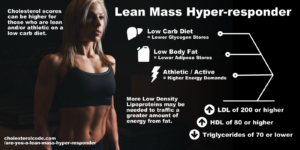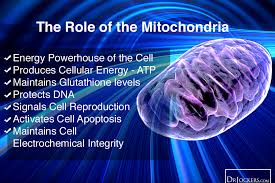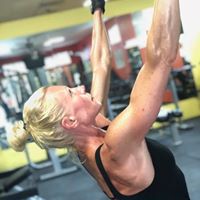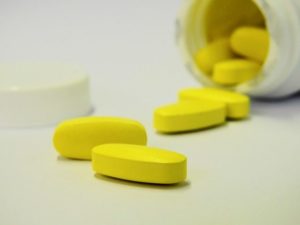How can I stay Fit n Healthy For Life?
Stronger. Fitter. Faster – my new personal health goal.
With already a healthy diet and lifestyle, getting my blood tested was my next step.
I started to wake up fatigued and wasn’t going to use the ‘over 50 and getting older’ as an excuse. There must be another reason. Other symptoms that started up included heavy legs (daytime) and leg cramps (night time) that hurt- this was weird!
Knowing I didn’t quite feel my usual self, I wanted to get to the bottom of WHY.
What shift did I need to make in my diet?
What supplements was I missing or taking too much of?
This is what prompted me to get my full blood work done.
Without looking ‘under the hood’ so to speak, you have no idea about how healthy you are.
Sure, you can guess by reading your body’s signs and symptoms. But to really know, you need to read your blood work by collecting data and biomarkers, having someone look under a microscope and send you the blood test results.
Blood doesn’t lie. There is no other way to tell with 100% confidence, if your diet is working for you, your supplements are what you really need, and if you’re reaching your peak performance.
Test Don’t Guess – Enter the world of blood testing
Blood testing is the most important step you can take to prevent life threatening disease. I know, because the testing I did revealed a genetic biomarker (Lp (a)) that apparently, puts me at risk of dropping dead of a blood clot. This is serious stuff! Details to follow……
The point is, having blood tests at your fingertips and most importantly, reading reading your blood work, gives you the power to take control of your own health. Catching critical issues before they manifest into heart disease, diabetes, cancer and the like.
This is where modern science can help move the dial in your own health – to keep you Fit n Healthy for Life too!
This is truly what I want for you – decades of healthy years ahead of you!
But sadly, typical blood tests from your regular GP just isn’t enough. They’re only good for testing to see if you are the ‘end stage’ mark (i.e dying).
Good news is, there is another way! You can order your own blood tests and measure every little thing that affect your organs, cardiovascular system, blood sugar regulation, metabolism, and hormonal health
Get the right blood test done and read your blood work to answer the questions like:
Why am I not losing body fat on my ketogenic or low carb diet?
Why can’t I sleep well at night?
Why am I waking up fatigued, heavy legs and muscle cramps? This was me. Answers to follow….
Running these tests wasn’t anything new for me either.
Clinically, after ordering these tests on dozens of clients over this past year, I have been able to uncover specific nutrient deficiencies contributing to:
Chronic Cough,
Anxiety,
Weight loss resistance,
Chronic infections,
Chronic fatigue,
Osteoporosis,
Poor resistance to stress,
Chronic kidney stones
Shortness of breath and poor exercise outcomes
It’s amazing when the blood work lines up with the specific health issues.
Here is the blood test that I order for my clients (and just recently, did for myself)
Spectracell Micronutrient Testing
Cardiometabolic and Pre diabetes Testing
Female and Male Hormone Panel Testing
Blood Tests-Recommended-updated
These are by far the most comprehensive testing both men and women can do.
Designed specifically for those seeking higher performance, uncovering missing pieces to solve their health and fitness puzzle, or simply as an anti aging tool to live a healthier, happier life.
Here’s a list of everything that’s tested:
Micronutrients – critical nutrients that dictate BODY FUNCTION
B Complex Vitamins – specific
- Vitamin B1
- Vitamin B2
- Vitamin B3
- Vitamin B6
- Vitamin B12
- Folate
- Pantothenate
- Biotin
Amino Acids
- Serine
- Glutamine
- Asparagine
Metabolites
- Choline
- Inositol
- Carnitine
Fatty Acids
- Oleic Acids
Other vitamins
- Vitamin D3
- Vitamin A
- Vitamin K2
Minerals
- Calcium
- Magnesium
- Zinc
- Copper
- Manganese
Carbohydrate Metabolism
- Glucose-Insulin Interaction
- Fructose Sensitivity
- Chromium
Antioxidants
- Glutathione
- Cysteine
- Coenzyme Q10
- Selenium
- Vitamin E
- Alpha Lipoic Acid
- Vitamin C
CardioMetabolic – biomarkers to assess cardiovascular health and pre diabetes risk
- Insulin
- Glucose
- HOMO-IR
- Hemoglobin A1C
- eAg
- C-Peptide
- Adiponectin
- Leptin
- Hs- CRP
- Triglycerides
- HDL
- Type 2 Diabetes Risk Assessment
- Cholesterol
- LDL
- Non-HDL
- Lipoprotein (a)
- Apolipoprotein B
- Apolipoprotein A1
- Homocysteine
- VLDL Particles
- Total LDL Particles
- Total HLD Particles
- Remnant Lipoprotein
- Dense LDL – 111
- Dense LDL -1V
- Buoyant DHL -2b
- Non-HDL Particles
- Cardio-Metabolic Risk Assessment
- Omega Check
- Arachidonic Acid/EPA Ratio
- Omega 6/Omega 3 Ratio
- Omega 3 Total
- EPA
- DPA
- DHA
- Omega 6 Total
- Arachidonic Acid
- Linoleic Acid
Hormone Balance – Female
- Estrone (E1)
- Estradiol (E2)
- Estriol Unconjugated (UE3)
- Luteinizing Hormone
- Follicle Stimulating Hormone
- Progesterone
- Prolactin
- Testosterone total and free
- SHBG
- DHEA – S
- IGF1
Hormone Balance – Male (adding these to Female)
- PSA
- Androstenedione
COMPLETE BLOOD COUNT OF RBCs AND WBCs
- Total RBC,
- hemoglobin,
- hematocrit,
- MCV, MCH, MCHC,
- RDW,
- platelets,
- Total WBC,: neutrophils, lymphocytes, monocytes, eosinophils, basophils.
LIVER & KIDNEY HEALTH
- URIC ACID
- BUN
- CREATININE
- BUN/CREATININE RATIO
- GFR
- SODIUM
- CHLORIDE
- POTASSIUM
- CO2/Bicarbonate
- TOTAL PROTEIN
- ALBUMIN
- BILIRUBIN
- ALT
- ALP
- AST
BASIC NUTRIENTS
- FERRITIN (SERUM)
- TOTAL IRON BINDING CAPACITY
THYROID PANEL
- TSH
- Free T3
- Free T4
- Total T4
- Reverse T3
- Thyroglobulin Antibodies
- Thyroid Peridoxidase Ab
- Anti TPO Ab
As you can see, I’ve covered a lot of ground here. Knowing this information can help to ‘fine tune’ your strategy to best diet and smart supplements for best health and fitness for life
My Test Results
Here is what I discovered from reading my blood work GP
May 28 2018 Complete Blood work GP
Muscle Enzymes high
What really stood out for me was my extremely elevated CK (muscle enzymes). CK is marker of extreme muscle breakdown. Basically I was breaking down more than building up……but why? Why was I not recovering fast enough? No wonder my legs felt heavy and were cramping up!
Iron levels low
Healthy levels for menstruating females are 50-100. My level was 22.3. So, I needed to bring those up. Pretty typical of a person who exercises the amount and intensity that I do. But, again good to know.
New supplement strategy
Iron: Heme iron polypeptide (non constipating) 30 mg per day with/without food (away from calcium)
My overall blood looked good: You have two components of your blood cellular (red, white, platelets) and liquid (plasma). All my markers were good and on point (too little or too much can lead to early mortality)
My blood sugars are perfect (hemoglobin A1C). Ideal levels are under 5. Mine is 4.6
My kidneys showed great filtration rates (GFR, creatinine) GFR ideal is over 90 (mine is 96) and creatinine best between 57 and 92. Mine is 65.
My liver enzymes (ALT) were decent on this test and Gamma GT (GGT) was at a good level. ALT: my reference ranges are between 7-56. Mine is 47. GGT is best under 15. Mine, a low of 9.
Phew! Having good liver function is something I actively strive for.
My inflammatory markers are low (HsCRP) with an ideal level of under 1. Mine is 0.16. Second phew!
My lipid profile (cardiovascular health) is perfect. No concerns with slightly elevated total cholesterol because the LDL, HDL and triglycerides are both in healthy ranges and best ratios. Total cholesterol levels over 6.22 are only a worry if the Hemoglobin A1C and HS CRP are high as well. Mine were both low and my total cholesterol was 5.84.

There is some fascinating research around a subset of the population categorized as Lean Mass Hyper-responders (LMHR).
Which I seem to fall into.
LMHR is someone who follows a low carb diet, has low body fat and athletic.
More about this later when I go over my comprehensive Cardiometabolic panel.
Thyroid panel looks good too. We want TSH under 1.5 and mine is 1.08. Best to do full thyroid panel though for more complete picture, which wasn’t done in this set of blood work.
Here is what I discovered from reading my Micronutrient Test
Mitochondria health – needs improvement
Mitochondria need proper amounts of COQ10, Vitamin B3, Carnitine, magnesium and D Ribose.
All of which I was showing low! With the exception of magnesium.
No wonder I was feeling fatigued! My mitochondria were not getting the nutrient inputs to match the energy output.

What are mitochondria?
Mitochondria are the energy center of the cell. They are what deliver energy by taking fuel (protein, carbs, and fats) from the blood stream and burning it in the presence of oxygen in the form of a substance called adenotriphosphate or ATP.
ATP is the actual currency of energy in the body. Anyone who wants more daily energy needs to know that if the energy delivery in the body goes slow – so do you.
My energy demands from my exercise where exceeding my nutrients from both my diet and supplements. Makes sense. After testing, I knew exactly which nutrients my body needed more of – no more guessing.

The Carnitine, Serine, CoQ10, B3. and Asparagine linked to muscle breakdown
Proper carnitine levels off sets the rise in creatine kinase (CK) and improves muscle recovery
Serine keeps an athletes hormone profile healthy by buffering post workout cortisol, which can cause muscle breakdown
CoQ10 mitigates muscle damage after high intensity training
Vitamin B3 (niacinimide) is needed to metabolize food stuff into energy. Low levels linked to whole body fatigue (including muscle)
Asparagine lowers from intensive exercise needed to mitigate muscle fatigue.
Check out the Nutrient Correlations to SPORTS NUTRITION
Here is a link to a handout on The Role of MICRONUTRIENTS In SPORTS MEDICINE
New supplement strategy:
Carnitine: 2 caps (500 mg each) X 2 /day away from food
Phosphatidylserine: 500 mg 2/day with food
CoQ10: 100 mg (ubiquinol form) 2/day with food
Asparagine: 500 mg 3/day away from food
Vitamin B3 (niacinimide): 500 mg per day
Other supplement additions I made was my PRE WORKOUT STACK.
- Amino replete – 9 essential amino acids
- Creatine
- D Ribose
Oleic Acid – low
Another big eye opener was the low Oleic Acid. This marker is super important. Getting this right means you can properly shuttle nutrients in and waste products out.
Oleic acid is a monounsaturated omega-9 fatty acid found in olive oil, flax seed oil and almonds.
Fats, oils, and essential fatty acids (EFAs) are the essential fatty acids for which your cell membranes are made. Why this is important is because all nutrient exchange happens at the cell membrane level.
Healthy membranes → good nutrient exchange = good health
Unhealthy cell membranes → poor nutrient exchange = sub optimal health
Knowing this, I’ve changed my fat choices to include more olive oil, olives, almonds, flax seed oil and fish oil (you will see why from my Cardiometabolic test) and less coconut oil, lard and butter.
Again, how would I ever know this unless I tested.
Calcium – low. Linked to osteoporosis, muscle spasms and muscle cramps
Yikes! Big wake up call as I am someone who has actively reversed Osteoporosis in my early 30’s. My body needed more calcium then I was giving it.
Calcium is the most abundant mineral in the body, with 99% residing in bones and teeth
Calcium deficiency is linked to muscle spasms and cramps.
This was exactly what I was experiencing!
New supplement strategy
Calcium: 1000 mg in divided doses throughout the day. 2:1 ratio with Magnesium. Taken away from my iron.
Here is what I discovered from reading my Cardiometabolic Test
Lipid Profile
Lipoprotein (a) – extremely elevated
Lipoprotein (little a) is an extremely atherogenic lipoprotein linking it to a higher risk of blood clots. So the medical research points out anyways.
However, more recent evidence shows Lp (a) having a different roll then we previously believed. Investigative reporter, Siobhan Huggins of Cholesterol Code uncovers some new information about Lp (a) and how it has shown to be more of a marker of wound repair. Which makes sense with my blood work and how it lines up with my high CK levels (muscle damage).
High Total Cholesterol, high HDL, high LDL
At first glance, this may seem worrisome, however, only a worry if cholesterol becomes oxidized. Such would be the case if your inflammatory markers are also high or your blood glucose is dysregulated or even if you had high triglycerides or high triglycerides to HDL ratio. Mine are all low (HS CRP, homocysteine, hemoglobin A1C, HOMO IR, and triglycerides to HDL ratio).
High HDL, inflammation is low = not a concern
High cholesterol, inflammation is high = be concerned
The question to ask is Are you a Lean Mass Hyper-responder?
To really get a handle on what your lipid profile is telling you, it’s all about ‘context’.
What is your diet, exercise and body shape look like?
Higher carb/lower fat with little exercise carrying excess body fat or lower carb/higher fat with regular exercise carrying low body fat.
If you have higher HDL, higher LDL and low triglycerides, you may be a Lean mass Hyper-responder.
According to recent research presented in Cholesterol Code, after pouring through tons of data, there is a certain subset of the population, particularly lean, athletic individuals who also eat a low carb diet have certain things in common. They have low adipose tissue (body fat), low glycogen stores due to their low carb diet, and they have have high energy demands because of regular exercise or constant movement.
So basically with the lower glycogen stores and higher cholesterol counts, they get very efficient at using ‘fat as fuel’ instead of sugar. And this shows up on the lipid profile. Lean mass Hyper-responders have high LDL particles because it has to move the fats around (triglycerides) into the cells for energy.
So when we see high HDL and LDL particles, and inflammation is low plus they are on a low carb diet, exercising, then there is not concern.
This is the category that I fall into so I am quite happy with my results.
Rethinking Cholesterol – good for the brain, digestion, sex hormones, and allows for the production of Vitamin D (from the sun)
I think it’s time for a reality check. Cholesterol is a vital nutrient for the body. Its so important that it makes up part of every cell membrane in your body, ensuring proper nutrient exchange in and out of the cell.
Cholesterol makes your myelin sheath (the covering around your nerves), and is critical for proper memory and brain cognition.
A recent study of twenty thousand people found strong evidence that those taking cholesterol lowering medications, called statins, had an increase in Parkinson’s disease.
If you know of anyone on statin drugs, I urge you to do more research for more natural ways to support the cardiovascular system – starting with a more comprehensive cardiovascular panel such as Cardiometabolic Testing.
Moreover, statin drugs does deplete the body of CoQ10. So it would be wise to supplement. Potential health risks include: various cardiovascular problems (yes, the heart needs CoQ10), immune impairment and low energy.
Now are there certain issues to pay attention to if cholesterol is high? Sure. If cholesterol is high and inflammation high – that spells bad news. Other markers to look at alongside high cholesterol is high Hemoglobin A1C and homocysteine. As well as high triglycerides (as explained above).
Here is what I discovered from my Hormone Test
Low Free Testosterone and high Sex Hormone Binding Globulin (SHBG)
SHBG or Sex Hormone Binding Globulin, controls testosterone effects in both men and women.
When SHBG goes up, testosterone goes down. Which is what happened to me.
Reasons for high SHBG are: medications (which I am not on), genetic variation (maybe for me), low omega 3 (which did show up on my Cardiometabolic test), low vitamin D3, DHEA, (not the case for me) and high resistance training (which for sure is the case for me).
High insulin seems to bring SHBG down, so being on a low carb diet (with lower insulin levels) this may be the case for me also.
After speaking to the Functional Medical Doctors from Spectracell labs, their solution was to take Boron, fish oil and Indol 3 Carbinol.
All other hormone markers are perfect. So I am happy with that.
New supplement strategy:
Boron: 5 mg 2 times a day with food
Indol 3 carbinol: 300 mg per day with food
Second set of blood work – GP (a few months after implementing New Supplement strategy as shown above)
Oct 17 2018 Complete Blood work GP
Wonderful news! My CK levels dropped to 584 from 1037! What I am doing is working.
Iron up a few points to 25.1 but still needs to rise.
Guess more liver for me!
I plan to retest my Cardiometabolic, Micronutrient, and Hormone test 6 months from my last test and will report the results, after taking my new supplement regime. See summary below

New Supplement Regime (summary)
Iron: Heme iron polypeptide (non constipating) 30 mg per day with/without food (away from Calcium) + liver 2 times a week.
Carnitine: 2 caps (500 mg each) X 2 /day away from food
Phosphatidylserine: 500 mg 2/day with food
CoQ10: 100 mg (ubiquinol form) 2/day with food
Asparagine: 500 mg 3/day away from food
Vitamin B3 (niacinimide): 500 mg per day
Fish oil: 3 grams per day
Calcium: 1000 mg in divided doses throughout the day. 2:1 ratio with Magnesium. Taken away from my iron.
Boron: 5 mg 2 times a day with food
Indol 3 carbinol: 300 mg per day with food
Continued liver detox and support (on going), probiotic, B complex, and pre workout stack (amino replete, carnitine, and D Ribose).
Diet changes: less saturated fat (coconut oil, butter and lard) and more omega 9, unsaturated fats (olive oil, olives, avocados, and almonds).
Well, I hope you have found this helpful. My point to this rather lengthy blog post is that to really know about how healthy you are, test and don’t guess.
Read your blood work then adjust your diet and supplement regime and RETEST. Ideally every 6 months.
I truly want the best for you. Best health and happy long life.
Fit n Healthy for life!
If anyone would like help with blood tests, read your blood work and have your own Personalized Diet and Supplement Strategy – then please contact me at Contact Michale
You can also leave me a comment or reply below.
